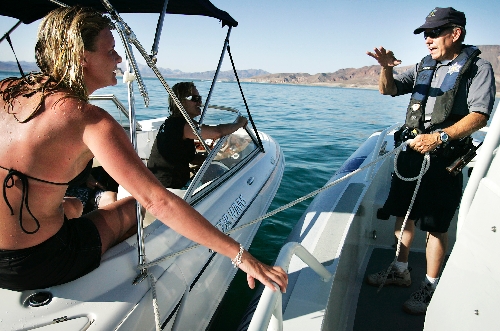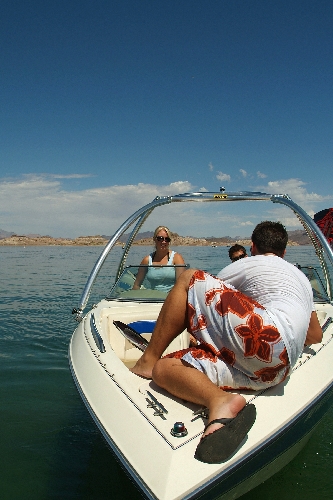Life jackets, sobriety and education urged for boaters
When it comes to water safety on the lake, there are three important precautions that Edwin Lyngar, boating education coordinator with the Nevada Department of Wildlife, wants people to remember.
"Wear a life jacket, boat sober and take a boating class," Lyngar said. "If people would do those three things, there would be a tremendous reduction in accidents and fatal accidents."
With the heat rising, the Lake Mead National Recreation Area is seeing more people wanting to using the recreation amenities from Jet Skis and boating to kayaking.
The increase in participation also results in about five accidents per summer, Lyngar estimated .
The Nevada Department of Wildlife, which tries to prevent incidents through education, is the boating safety and enforcement agency for Nevada.
Lyngar's No. 1 tip is to wear a life jacket. It is mandatory that all boaters, whether kayaking and canoeing or sailing, have a life jacket.
"It is recommended they wear it but not required," Lyngar said. "However, children under 13, it is required to wear one."
Stand-up paddling is growing as a recreational activity, Lyngar said.
"(Stand-up paddlers) erroneously believe they are not required to wear one," Lyngar said.
Even though there isn't a mandate on it, Lyngar also suggested that people invest in life jackets for their dogs if they choose to take them on the lake.
"But if you are going to make your dog wear one, you should wear one," Lyngar said. "People often take care of their pets before themselves."
Of the top issues at the lake, Lyngar said alcohol consumption is No. 2.
"People equate boating to drinking," Lyngar said. "Those two shouldn't go together. Operating a boat while impaired is the exact same as drunk driving."
Those caught driving while under the influence could face stiff penalties, including a $1,000 to $1,200 fine and jail time.
Lyngar estimates that two out of five of the fatal accidents each year are due to alcohol consumption.
Lyngar said people usually use their boats only about four times a year and might be rusty behind the wheel.
"Imagine if you only drove your car four times a year," Lyngar said. "Imagine how good of a driver you would be. Now add alcohol to that."
Passengers are allowed to drink, but Lyngar recommends that they wear a life jacket.
"If you're drunk and you fall over, you are not going to be able to swim," Lyngar said.
To ensure safety and to make sure people know the rules of the lake, Lyngar suggests that people take a boating education class.
People born after Jan. 1, 1983, are required to have a boating card to operate a vehicle that has more than 15 horsepower, according to the Nevada Department of Wildlife.
Before people can pull out of the marina, there is supposed to be an employee at the marina to check the card. If people are caught driving a boat without one, they will get a ticket.
The Nevada Department of Wildlife offers free classes. Classes are offered only in person, but boating education cards are good for life.
Lyngar said the class covers various aspects of boating safety, such as which side of the boat people should pass on because there are no traffic lanes or how to properly tow something, such as a wake boarder.
"A lot of the information people don't even realize," Lyngar said.
Lyngar said that when people are pulled over on the lake and given a ticket, they are surprised to learn that they were breaking any laws. Classes give boaters the information beforehand so they shouldn't have to worry about getting tickets, he said.
Most tickets cost about $80 to $120, which include offenses such as not having a life jacket or not carrying a fire extinguisher, which is required for boats.
A reckless operation offense can cost several hundred dollars.
"Wake jumping is considered reckless and very illegal," Lyngar said.
Wake jumping, Lyngar said , is when a boat uses the waves made by another boat to jump in the air.
"Kind of a daredevil-type move," Lyngar said. "Imagine a car driving fast and at the last minute swerving into your lane."
Boating and water safety aren't just for larger boats. People who kayak and canoe could use the information, too.
"They tend not to generate complaints," Lyngar said. "They are the more vulnerable ones on the lake."
Lyngar's biggest advice to smaller boats is to stay out of the way of larger boats.
Lyngar is all about safety on the lake but only to ensure that people enjoy themselves.
"We are all about recreation," Lyngar said. "We want people to have a good time without getting hurt or hurting someone else."
For more information, visit ndow.org.
Contact Henderson/Anthem View reporter Michael Lyle at mlyle@viewnews.com or 387-5201.


















